Companies sign contracts to work for other companies, communicating digitally to get things done as agreed. They manage tasks with different teams, share what’s needed to deliver quality work, and manage the risks that will affect the delivery of the work.
Sound familiar? Yes it’s pretty much every industry.
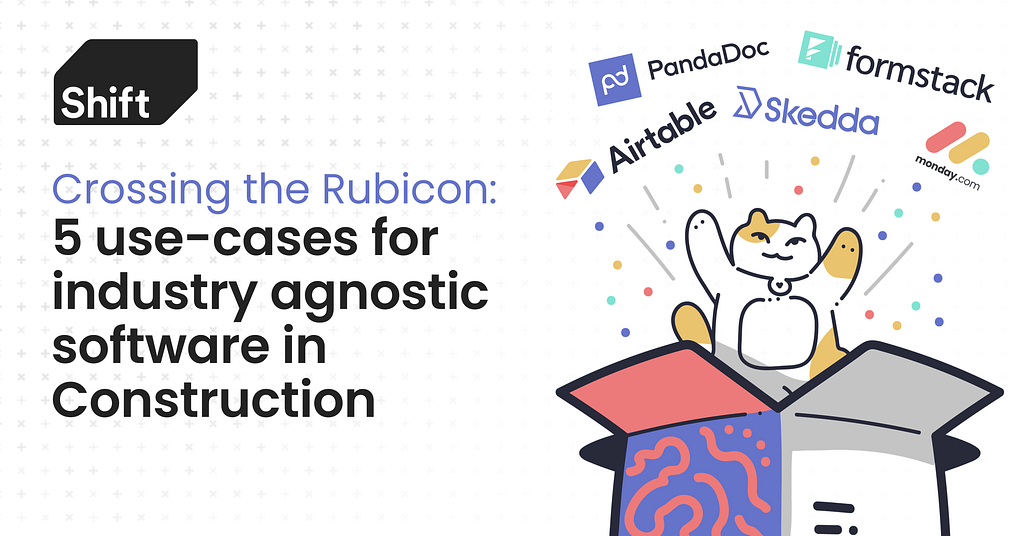
There is no doubt in my mind that Construction is a highly unique and highly nuanced industry; no other industry that I know of covers such a broad range of activity. That being said, many of the activities are shared across other industries if you distil them down to their core functions. This is why I believe there is a real opportunity to not be bound by the limits of “Construction-Tech” when delivering digital innovation in companies, and instead start to look at the broader software markets to see if we could solve our problems. With that in mind I’ve had a play around with 5 use-cases where I think Construction would benefit from looking at more generic tools.
The benefits of buying generic
Before I jump into the use-cases, here’s a few benefits that I’ve found, from experience, in using generic software:
- Cost — Industry specific software is always more expensive, take Fieldwire as an example. It is £46/user/month for its task management platform. Trello, a much more powerful platform (that misses a few features you probably have in your CDE anyway) comes in at £7.95/user/month.
- Implementation & Awareness— Due to the size of the market the generic platforms are dealing with they are more geared up for off the shelf implementation. Great help articles and lots of forums and discussions online to troubleshoot.
- Product Growth — The overly simplified formula for platform growth is Money = Features. The smaller your market, the less money you have, the less features you can develop. I experienced this first hand at 3D Repo.
- Free Trials — Much more common in generic platforms than industry specific ones, a free trial will let you play around with the platform and test its limits before you even go out to look for a budget.
- Integrations — As an example, Zapier (a popular integrations platform) has almost 7,000 apps offering integrations. Of these I found less than 10 that were focussed on Construction. All of the platforms in this article have integrations on Zapier, and 4/5 of them have Open APIs.
So with that in mind, let’s get started.
Plant & Crane Booking
Tower Crane bookings for major projects should not be run out of Excel. Seems obvious but it is a little too common in my experience. For this example we’re going to benefit from the post-pandemic boost in coworking and leverage the desk booking platform skedda.com.
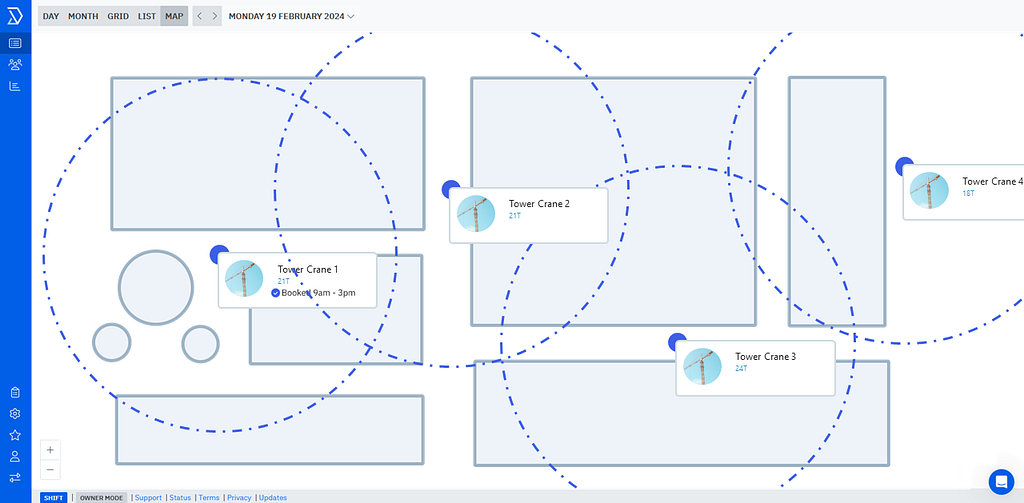
You can sign all of your Subcontractors up for accounts, allow them to book using an online portal and even use integrations to tack bookings against the short-term program.
Why I like it:
- Upload your own site plans to make it easier to understand which plant you need.
- Set quotas on Subcontractors (eg. only allowed 20 hours of hook time a week)
- Track utlisation to understand capacity and demand in order to tweak the logistics strategy.
- Crane operator can use the included app to manage jobs, clocking on and off for different subbies.
- Opportunities to maximise downtime when Cranes are ‘off-hired’
Price: £80/project/month
Alternatives: SwipedOn, Lemon Bookings, Microsoft Bookings
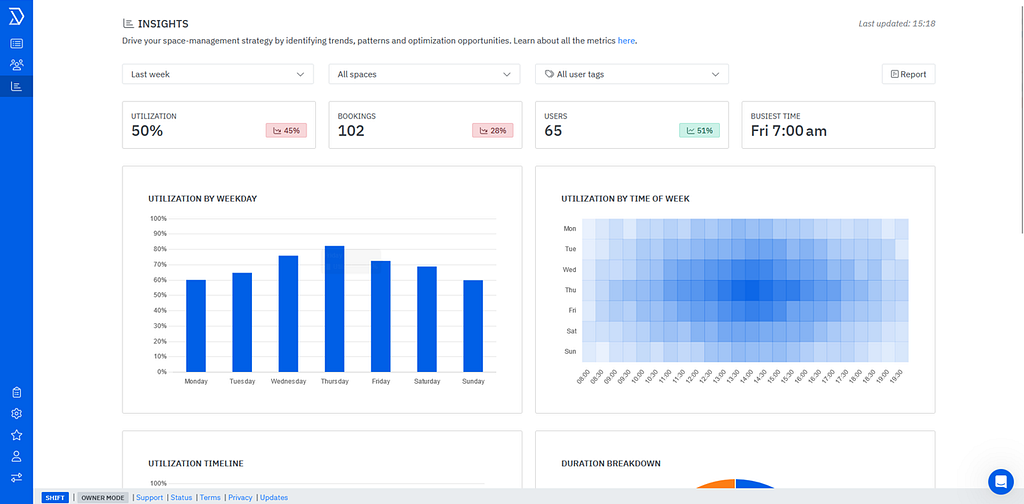
Short Term Planning
Given how Manufacturing and Software development have hyper-optimised time and task management over the years I think there’s a real opportunity to leverage the apps that they use.

There are some great short term planning tools already in the construction space, and I’m not really clear why they aren’t used more often. If I’m to assume it’s due to price sensitivity then here’s an opportunity to make your post-it note sessions a little more digital. Monday.com has all of the mod cons you would need for tracking your daily work plans.
Why I like it:
- Comment or upload documents to any task, gives a much better audit trail than emails.
- Mark progress on the app, ideal for requesting progress updates ahead of the morning meeting.
- Create Make Ready needs relationships to ensure the previous work is complete before setting off.
- Set notifications and Microsoft Teams integrations to keep the work moving.
Price: £8/user/month
Alternatives: Trello, Asana, Clickup
Contract Drafting
Coming from a family of Commercial Managers and starting my time in this industry as a QS, I’ve heard a lot about what goes on when various Stakeholders don’t understand the terms of the Contract, only to find that the particulars of the Contract are exclusively stored inside butchered Word documents with hard to comprehend revision structures.

The standard forms of Contract enable a lot better control of the various Z-Clauses and amendments, but what if we took it a step further? What if every Contract was a record in a database, rendered as a PDF only when it was necessary to share it? Pandadoc.com allows you to create Contract (or any type of document) using variables. These variables can be populated directly into the document of via forms.
Why I like it:
- Template consistency means no nasty surpises.
- Variables can be reviewed outside of the document itself, meaning you can check for anomalies across your entire company, identify risks and monitor project commitments using just the API.
- Approval workflows mean a full audit trail of internal approvals.
- Let your legal team standardise your approved Z-Clause wording so that each project can search and deploy the most relevant ones.
- Integrated eSignatures make life easier.
- API could link to estimating or costing systems to automatically integrate BoQs
Price: £39/User/Month (User being the Contract creator)
Alternatives: Ironclad, Juro
Risk Management
I went in to a lot of detail about this on an earlier Medium post (📄 How to build your own Construction Risk tool). To give the abbreviated version; Risk Registers are just a series of records with statuses and workflows, it is becoming increasingly common for companies to ‘roll their own’ data management tools using Airtable or other similar platforms.
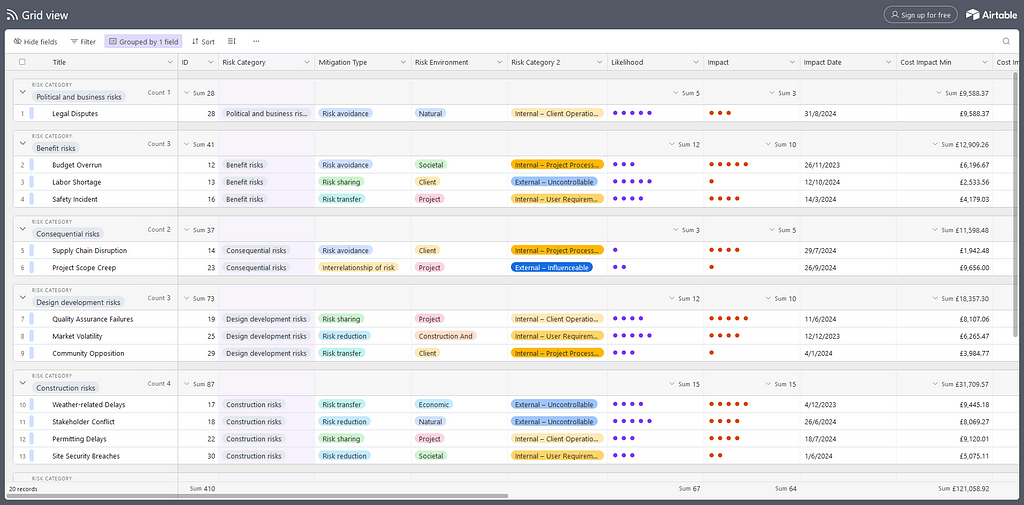
One of the more interesting parts of the original article was around using the API to conduct Monte Carlo simulations on the data. This means you can offload the compute intensive part of the process and set up automated simulations daily, weekly or in line with your reporting output.

Why I like it:
- Flexible, you can use it for a multitude of use cases; Risk, Health & Safety registers, Project Management etc.
- The new ‘Connected Apps Platform’ mean you can create highly customised UI experiences
- Built in workflow engine so that you can add approvals or notifications
- Excellent mobile app for filling in forms out in the field
Price: £16/User/Month
Alternatives: Coda, Retool, Nocodedb (an excellent open source option)
Contractual Notices
Whether you are using JCT, NEC, FIDDIC or you’ve got your own Contracts; odds are you have some predefined mechanisms to notify the other parties. Early Warnings, RFIs, Technical Queries, Compensation Event Notifications, Payment Certs, Payless Notification.
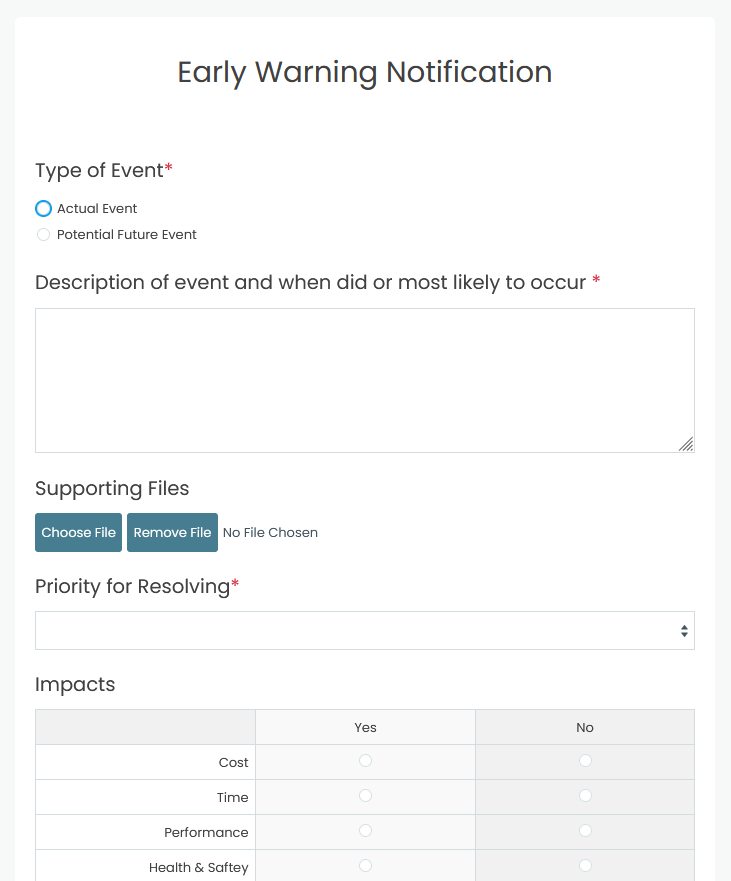
To be frank I’ve not been overly impressed with the Construction-Tech based solutions I’ve seen to date, it’s a fairly straightforward process detailed explicitly within the Contract so it translates nicely to more generic platforms such as Formstack.com. You can populate templates, develop approval workflows both internally and externally.
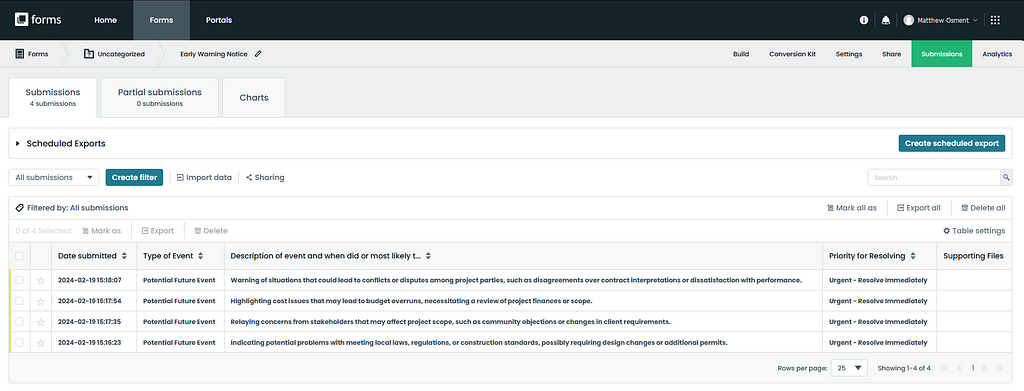
Why I like it:
- Consistent and reliable data collection, no more facts and figures hiding in Word documents.
- Set up notifications based on form content. Early Warning marked as urgent? Notify the Project Manager in Teams. H&S observation critical? Send out an alert to all black hats.
- Internal approval processes with inline edits so to reduce back and forth on amendments.
- Complete Audit trail accessible via API.
- Give senior commercial leaders insight into project operations. Spotting anomalies and parachuting a specialist onto the project could save a job
Price: £0.0025/form submission
Alternatives: JotForm, PaperForm, Sharepoint Lists
Conclusion
You might have noticed as you were going through the list that there was a lot of overlap. You could use Airtable to do contractual notices, or Monday to run your risk mitigation platform, or any of the platforms I’ve mentioned to do a myriad of other things. This is part of the appeal for me of talking to clients and understanding their needs, if you are willing to compromise on some of the more extreme use cases you can find that you can roll out systems that cover off a larger part of your business operations very quickly. Much better than trying to deploy a unique system for each business vertical (and your IT Admins will love you too).
If you want me to jump on a call and have a talk about any of the systems or processes I’ve mentioned, or if you have different digital challenges just drop me a message on LinkedIn. As always, I will continue to post content here that I hope is valuable, so please consider subscribing to get the articles straight in your email inbox.
Crossing the Rubicon: 5 use-cases for industry agnostic software in Construction was originally published in Shift Construction on Medium, where people are continuing the conversation by highlighting and responding to this story.
